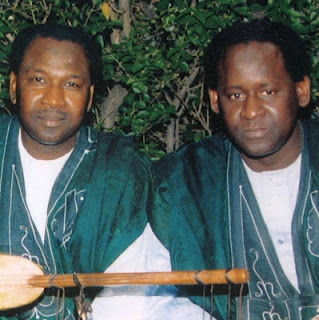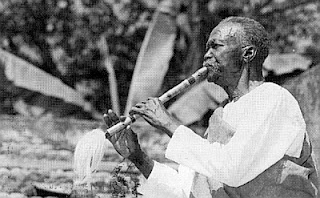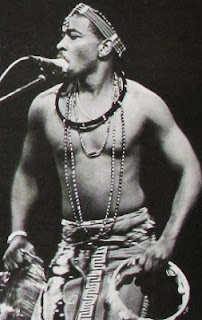3 versions of the sublime Nanfoule/Nanfulen *
the oldest I'm aware of , that of Mahawa Kouyaté and Soundioulou Cissoko
the Balla/Balladins 1969 version , bside of SYL 508 - Tara been the a side
and the most recent of Mory Djely Kouyaté & Jean Philippe Rykiel
another version there
& more versions in worldservice
*na n foule -come, release me. a song dating back to ww2 when the French imposed draconian rations on their colonies and prohibited trade with the British colonies such as Sierra Leone. it is attributed to a griot merchant that was caught in a contraband traffic and was tortured by the colonial customs officers...
the original must have sounded like this
Thursday, January 31, 2013
Tuesday, January 29, 2013
Moussa Abdoulaye et Diadié Abdoulaye Cissé
the always amazing brothers Moussa Abdoulaye and Diadié Abdoulaye Cissé
originally from Guidimakja region, Mauritania
in a generous taste from their "space" geseru (=soninké griot) sound
here with Mah Damba and Jean-Philippe Rykiel
M'bawdi Guidimax
thanks ngoni
.*
Sunday, January 27, 2013
Memórias Artur Nunes

its only sad that there is so little information on the net about such giants as Artur Nunes .
all I could gather in bits and pieces:
Artur Nunes was born in Barrio Cuba, Sambizanga in 1950 to an Angolan mother and a North American father
More than a legend in his time,Artur Nunes was the angelic voice and one of the most influential composers in the pre-independence days of revolutionary Angola.
His songs drew inspiration from kombas,the funeral rites where women sang laments… His unique style for “songs of the soul” earned him the nickname, “the Spiritualist.” From 1972-76, he recorded a dozen singles, plus two songs on the 33rpm collection Rebita 75.
He perished in Sambizanga in the aftermath of the May 27th, 1977 unfortunate protests .
Artur Nunes material is fully presented in this collection from Colecção Poeira no Quintal,a project launched by Rádio Nacional de Angola,
all the 26 songs he recorded from the late 60's through the 70's with these backing bands:
01-Os Merengues-Imperialismo
02-Jovens do Prenda-Anangola Yá Dila
03-Jovens do Prenda-Uá Eu Muangola
04-Jovens do Prenda-Kalumba Kami
05-Jovens do Prenda-Kizua Ki Nguifua
06-Jovens do Prenda-Mana
07-Jovens do Prenda-Tia
08-África Rítimos-Ku Zambizanga
09-África Rítimos-Minha Rola
10-África Rítimos-Hó Kitadi
11-África Rítimos-Ngongo Tolo Mona
12-Jovens do Prenda-Mena
13-Jovens do Prenda-Nguma
new link 1
*****
01-Jovens do Prenda-Ngola Tua Itambula
02-Os Kiezos-Ho yó Monandengue
03-Os Kiezos-Chico
04-Os Kiezos-Dituze
05-Os Kiezos-Jota
06-Jovens do Prenda-Laura
07-África Rítimos-Não Sei Porquê
08-Os Merengues-Kubanza Kua Anangola
09-Jovens do Prenda-Zinha
10-Jovens do Prenda-Ku Muxito Kwala Anangola
11-Jovens do Prenda-Mukila
12-Jovens do Prenda-Belina
13-Jovens do Prenda-Njila Yá Kuako
new link 2
*****
if you have more biographical details to contribute please welcome
Friday, January 25, 2013
Ewe drumming from Ghana
 Music is a communal event in Ewe culture. Of the utmost importance is a musicians ability to relate to the other musicians he/she is playing with. No matter if you are a professional, or merely tapping out a rhythm on a glass bottle with friends. How much you understand about the concept of interdependence is what makes the music great and fulfilling in the eyes of the Ewe.
Music is a communal event in Ewe culture. Of the utmost importance is a musicians ability to relate to the other musicians he/she is playing with. No matter if you are a professional, or merely tapping out a rhythm on a glass bottle with friends. How much you understand about the concept of interdependence is what makes the music great and fulfilling in the eyes of the Ewe.There is also a relationship between the musician and the listener. As the music is played it is important for the listener to keep their own time with the music. A listener must "feel" a pulse in the music even when it is not explicitly played by the instruments. With the understanding that the listener is mediating their own rhythm, the musicians are free to embellish, compliment, challenge, confuse, and amaze a listener. It's a relationship that's purely musical, but stems from how people in the community relate to each other. The societal structure is mirrored through the musical culture.
An important aspect of playing drums and dancing is style. The music must always be moving forward, but must also be steady and have strength in repetition. In order to keep the music interesting, players are encouraged to give their own improvisations within the playing structure. It can be compared to devotional that is interjected into a Baptist service by a member of the church. The music is organized to be open to the rhythmic interpretation a drummer, a listener, or a dancer wishes to contribute. John Miller Chernoff quotes in his work African Rhythm and African Sensibility; "In one sense the deepest unities may be achieved when people relate through a better awareness of their differences".
Improvisation is about gaining knowledge and using that knowledge tactfully.
source
the soup which is sweet draws the chairs in closer
correct!
Monday, January 21, 2013
Sunday, January 20, 2013
Evalisto Muyinda
another one from the archives(updated) till these annoying matters with
packupload are solved -inactive for the second day.I will remain optimistic in spite all odds
The Baganda people make up the largest ethnic group in Uganda, though they represent only 16.7 per cent of the population. (The name Uganda, is in fact the Swahili term for Buganda)
They speak a Bantu dialect called Luganda belonging to the Niger-Congo family. Like many other African languages, it is a tonal language which means that some words are differentiated by means of pitches. Words that are spelled in the same way, however, have a different meaning. It is a language that is rich in metaphors and proverbs.
Buganda is located in central Uganda as the region of the Baganda people. Its nucleus is Kampala city. Baganda's boundaries are marked by Lake Victoria in the south, the Victoria Nile River on the east, and Lake Kyoga on the north. The kingdom comprises 52 clans. At present it is the largest of the traditional kingdoms.
packupload are solved -inactive for the second day.I will remain optimistic in spite all odds
The Baganda people make up the largest ethnic group in Uganda, though they represent only 16.7 per cent of the population. (The name Uganda, is in fact the Swahili term for Buganda)
They speak a Bantu dialect called Luganda belonging to the Niger-Congo family. Like many other African languages, it is a tonal language which means that some words are differentiated by means of pitches. Words that are spelled in the same way, however, have a different meaning. It is a language that is rich in metaphors and proverbs.
Buganda is located in central Uganda as the region of the Baganda people. Its nucleus is Kampala city. Baganda's boundaries are marked by Lake Victoria in the south, the Victoria Nile River on the east, and Lake Kyoga on the north. The kingdom comprises 52 clans. At present it is the largest of the traditional kingdoms.
The Baganda People passes through the stages of omwana (child), omuvubuka (youth), and omusajja or omukazi (man or woman). After death one becomes an omuzimu (spirit), and the Baganda also believe in rebirth .
Their music is mainly slow with more emphasis on a regular meter. It is composed of contrasted lyrics and yodles .The Baganda have a huge variety of song forms such as; lullabies, historical songs, work songs, ceremonic songs, praise the kings (royal songs), wedding songs, etc. The scale is purely pentatonic.Most of the vocal lines are in a responsarial form, solo form and chorus form. Since these songs are vocal dominant, they are basically meant to deal with social transformation. Funerals are major ceremonial and social events.
In addition to voice, a range of instruments are used, including the Amadinda & Akadinda xylophones, the Ennanga harp, the Etongoli lyre, drums, and the Kadongo (plural "budongo") lamellophone.
The several ensembles of court musicians maintained by the Kabakas were guardians of both political and musical tradition.The language is metaphorical and symbolic.and employs humour, mime and community theatre to generate positive values upon which current social conduct can be based.The kadongo, was more recently introduced to Baganda music, dating to the early 20th century.
After the kingdoms were abolished in 1968 by Milton Obote, most of the musicians refused to play royal music anymore, as a form of protest. Two decades later, most of the Abalere ba Kabaka were dead, or too old to play.Evalisto Muyinda one of the last remaining court musicians, developed and led ensembles formed from all the types of royal instruments, but he focused mainly on the amadinda xylophone, besides working for the National Museum and leading The Heartbeat of Africa dance ensemble.These 1991 recordings are featuring ennanga, endongo, endere , endingidi , amadinda and akadinda , percussion and vocal pieces.Evalisto Muyinda died two years later in 1993.
more to read here here here & here
....as formerly played at the court of the Kabaka
Tuesday, January 15, 2013
Yenna-d umghar
What will he tell us?
What has he revealed?
He says: "whatever happens
The same has occurred in the past
Nothing is new
The sky like a vault
Covers the world
And observes all since creation
It watched the days build the centuries
It saw what has happened
It sees what is happening
It saw men
Killing other men
It saw the mistakes of men
And sees them persisting in error
Whatever happens
The same has occurred in the past
Nothing is new
What time builds
Time demolishes
What was good
Becomes evil
What was evil
Becomes good
Life turns
Redistributing the roles
«Mix it and it will become clear...»
So they say to us
But comes after the turmoil
What we do not wish for
Whatever happens
The same has occurred in the past
Nothing is new
Justice is just a word
A companion of Utopia
Many are those who run after it
And never find it
Arbitrary power is ancestral
It was there since the beginning
It lives in you
Fed by your fear
It nourishes
He who craves greatness
It appears to you as intelligent
When it is there to harm you
Whatever happens
The same has occurred in the past
Nothing is new
The needy is pitied
He doesn't find respite
The torments strike him down
And eat away at his carcass
The rich man is pitied
He has in excess
Goods which he holds
And becomes alienated
The wise is pitied
His brain is tormented
Those who see him
Do not understand
Whatever happens
The same has occurred in the past
Nothing is new
Beauty is a marvel
For those who are young
They look at it with different eyes
Beauty waits for their gaze
To mature and deepen
But the young are dazzled
And beauty leaves in despair
When old age comes
And restarts looking for it
Hoping to see it
But hope is useless
Whatever happens
The same has occurred in the past
Nothing is new
When strength is present
Wisdom is lacking
When wisdom is present,
Strength has already left.
The mistakes of youth
Forge the regrets of old age
This is, and will be
And can't be avoided
Who is looking for peace
Can't find its trace
Who's got peace
Is unaware of its value
Whatever happens
The same has occurred in the past
Nothing is new
Pure water
washes you
The water is soiled
Yet you are purified
You soil those
Who give you purity
You untie and free
Those who cultivate evil
Why do you want
to know everything
Just stay as you are
And you life will be fulfilled
Whatever happens
The same has occurred in the past
Nothing is new..."
Friday, January 11, 2013
Wednesday, January 9, 2013
Monday, January 7, 2013
Philip Tabane and Malombo - Malombo
let's venture into this new year with a very special guest
beloved guitar sangoma-healer and Artist (all with capital letters) Philip Tabane
(visit the link below for discography)
Malombo the album is a remarkable journey of musical discovery
with Philip Tabane uncovering both old and new worlds from deep within the unique
open-ended sound that is Malombo music
In these eight songs he winds through ancient African melodies
and rhythms whilst using his electric guitar,flute and the dark hum of his voice
to endlessly refine the traditional sound for a contemporary audience.
However his sweeping improvisations
are locked into devastatingly simple African songs structures,
held together by the Malombo drums
carved from the roots of the baobab
and draped with cowhide....
from the back cover
Philip Tabane and Malombo - Malombo
first released as Malombo from Kaya records-Kaya300-1984
this pressing Kijima records 1988
Malombo
Philip Tabane- guitar vocals and flutes
Oupa Monareng -malombo drums
Fish Phale-assorted percussion
Thuli Tabane-additional vocals
with
Amos Lebombo bass
Alpheus Koloti additional flutes
on Sangoma and Hi Congo
a discography at flatint
xc
Saturday, January 5, 2013
Subscribe to:
Posts (Atom)




















